
Who doesn’t love kittens? They’re fluffy, cute and entertaining but it’s important to remember that the decision to adopt a kitten is not a decision that should be made lightly. If all goes right, your new kitten will be a member of your family for more than a decade, so you have to be sure you’re ready for a long term commitment. As cute as kittens are, raising one can be quite a challenge. If you’re properly prepared and have everything ready, you should do just fine. For that reason, I’ve put together a helpful guide of the ten things you need to know before you adopt a kitten.
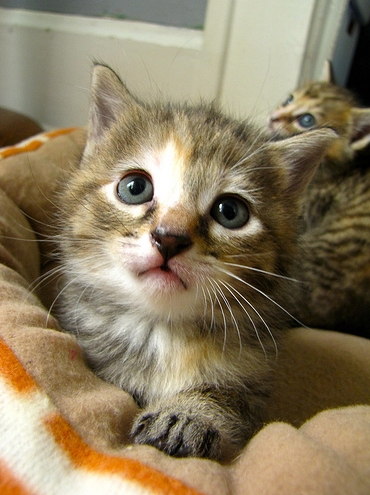
10: Adopting from a shelter VS buying from a store
There are animal shelters all across North America that are filled with cats and kittens in need of a good home. Due to the costs of housing such a high volume of animals, some of the shelters are forced to put perfectly healthy animals down. I would highly recommend adopting from a shelter. In addition to helping out the shelter and the kitten you adopt, many shelters work with local veterinary clinics to pay a portion of the cost of spaying or neutering your new pet.

09: Kittens VS Cats: Which is right for you?
Whether or not you adopt a kitten or a cat is entirely up to you, but you may want to consider an older cat, especially if you’re adopting from a shelter. Older cats are generally more laid back than kittens. If you have kids, you can look for an older cat that is good with kids. Alternatively, it is often hard to break an older cat of bad habits so doing so might take a little more time and patience. Older cats often have developed their own personalities which can be either a benefit or a disadvantage depending on the cat. Most adult cats at animal shelters will also be spayed or neutered and had all of their needles, so that might be a deciding factor if you’re worried about those initial vet costs.
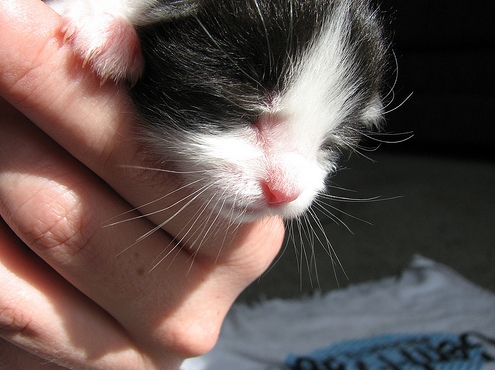
08: Are you allowed to have a kitten?
If you rent your home, you need to be sure you’re allowed to have a cat. You don’t want to bring your kitten home only to find out you have to give it away. First, it can be hard to find a good home for your new kitten if you aren’t allowed to keep it. Second, if you’ve gone through all the trouble of getting ready for your kitten, you don’t want to have to give it away. Third, you’re going to bond with that kitten as soon as you take it home. You can’t use the excuse that other people in your building have cats. They may have asked permission first so save yourself the trouble and do the same. Most landlords will simply ask that you agree to pay for any damage the kitten does to the apartment if you move out.
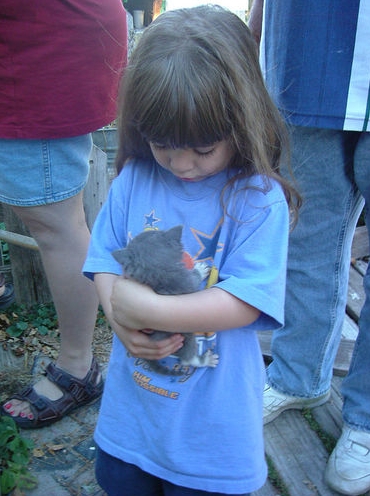
07: Kids and kittens
Kittens are a great pet for a household with kids, but you need to watch carefully while they play. It isn’t hard for a child to hurt a kitten by accident while playing. It’s hard for younger children to understand the difference between a kitten and a stuffed animal, so make sure you’re there to correct any potentially dangerous behavior. Remember, kittens have sharp little claws and teeth and will use them if they feel threatened. Although you might think it’s cute for your child to chase the new kitten, your child could hurt the kitten or the kitten could feel threatened and hurt the child. It’s all about supervision. As long as you’re careful, your child and the new kitten should get along fine.
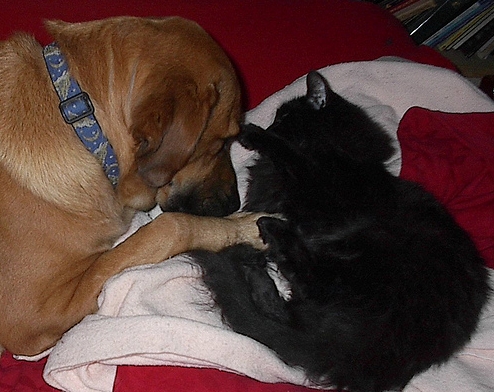
06: Kittens with other pets
Cats are solitary animals but that doesn’t necessarily mean you can’t introduce a new kitten to your home if you have other pets. Cats and dogs are not the mortal enemies some would have you believe. My Speeze and my dog, Deniro are not best pals. They treat each other with a strained indifference, but that isn’t always the case. When introducing a cat to a home with a dog, you need to make sure you show your dog a little extra attention and affection so they don’t feel threatened by the newcomers. Introduce the cat and dog carefully and give them time to get used to each other. A friendship doesn’t happen right away. Be patient.
It’s important to remember cats are predators by nature. If you have birds, fish, bunnies, hamsters or other small animals, you’re going to have to watch your new kitten with those pets. Make sure your kitten knows that those animals are friends and not prey. Correct any aggressive behavior on your kitten’s part using a squirt bottle. Most importantly, give your kitten time to get used to those new friends. Leave your small animals in their usual cage and let the kitten get used to the sight and sound of your smaller pet going about its daily business. Never let your small animal out of its cage around your kitten until you’re sure your kitten is no longer a threat. It will take time, but it’ll be worth it. In the end, your kitten will be able to control those ‘attack’ impulses and will get along just fine with your other pets.
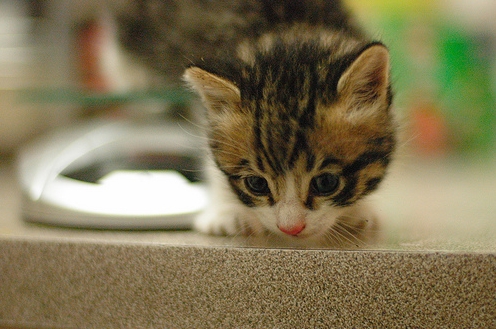
05: Kitten proofing your home
It is important to kitten proof your home before you bring home your new friend to protect your home and to protect your kitten. Kittens are energetic, curious, furry little balls of destruction. Make sure any breakables are well out of your new kitten’s reach. Remember, kittens love climbing and jumping, so when you are moving breakables, make sure you take those pass times into account. Kittens don’t mean to be destructive (although it certainly seems like they do sometimes). It is merely a byproduct of their natural curiosity and agility. Candles should never be left unattended with a kitten or a in the house. Make sure all of your windows have screens if you intend to leave them open and make sure balcony doors are always screened in or closed. Pretty simple stuff, but definitely stuff that should not be overlooked.

04: Kittens are expensive
Litter, food and vet bills are all things you need to take into consideration before you adopt a kitten. We’re going to talk more about spaying and neutering in a moment, but for now, I’ll just say that it is important to have your pet spayed or neutered but it is fairly expensive. If you don’t have the money to have your cat ‘fixed’ look into low income options in your area. The SPCA offers many options for low income families that may be of help to you. You also need to make sure you have adequate money to get your kitten the shots it needs, to have it dewormed and to pay for flea treatments. All of these things are important for raising a healthy and happy kitty.
There is no set dollar amount to share for how much it costs to feed a cat and keep it in litter. Do a little research before you get your kitten. Go to the grocery store or the pet supply store and see how much cat food and cat litter costs. Buying litter in bulk is a great option. Go for the unscented kind as well. It’s less expensive and it’s also healthier for your kitten.
Figure out how much you will be feeding your cat and determine the costs from there. I give Speeze a small can of cat food every day (half at lunchtime and half at dinner time) but also leave dry cat food in her dish throughout the day so she can snack on it if she gets hungry. I buy cans of cat food by the case which is generally much cheaper than buying the cans individually. I don’t change her litter box every day. Instead I scoop and solids in the morning and before bed then change the box completely every Friday. This keeps the box clean and reduces the amount of litter I use.
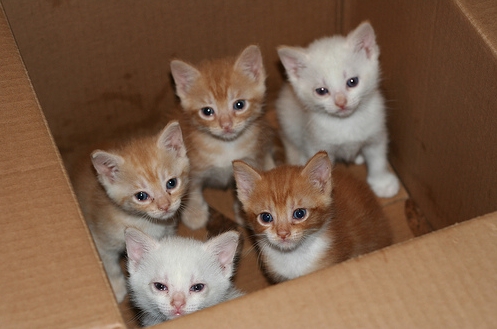
03: Spaying and Neutering is important. De-clawing is not.
It is of vital importance that you have your kitten spayed or neutered regardless of whether your cat will be going outdoors or not. First, having your cat fixed will prevent it from going into heat. A cat in heat is not a happy cat and it will likely drive you up the wall with its howling. Second, although kittens are adorable, it can be very difficult to find good homes for a litter of kittens. Finally, an unaltered cat is susceptible to all sorts of diseases including certain types of cancers. Having your kitten fixed is not only good for preventing unwanted pregnancies and saving your mental health but also gives your furry friend a chance at a longer, healthier life and can save you money on vet bills down the line.
De-clawing is absolutely cruel and entirely unnecessary. If you are concerned about your cat destroying your furniture either take the time to train it to use a scratching post and not your furniture or don’t get a kitten. If you’re having trouble training your cat and don’t mind spending a little money, you can ask your vet about ‘Soft Paws’. Soft Paws fit over your kittens claws and prevent them from digging. They also come in a variety of colors. They’re a bit pricey but they’re far more humane than de-clawing.
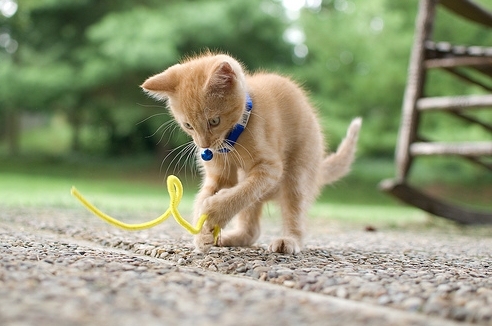
02: Important items you need to have for a kitten.
There are several things you need to have to keep your kitten happy and healthy. All of these things apply for all cats whether they’re going to go outside or not. You’ll need:
- A litter box
- Litter
- Food (wet and dry is ideal for a healthy kitty)
- Toys
- A scratching post
- A collar with an ID tag (just in case kitty gets out)
- A flea collar or other flea treatment
- A spray bottle or squirt gun (for training)
- Treats
Even cats that typically go outdoors to use the bathroom should have a litter box inside and be trained to use it in case of bad weather. You don’t want to send kitty outside to pee if there’s a horrible rain or snow storm. An ID tag is important as well, even if your cat stays indoors. Accidents can happen and your kitten may get out. Fleas can also get into your house even if your cat stays inside. Friends with animals may bring them in or you may bring them in yourself off of your shoes.
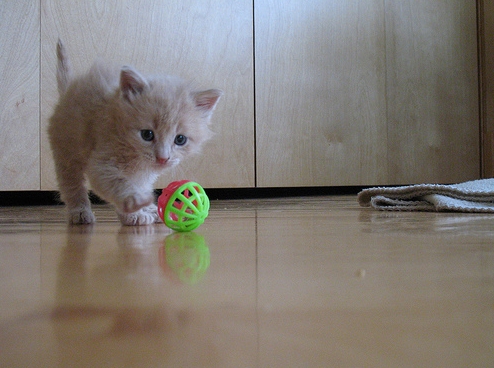
Toys are important because kittens love playing and giving them something to play with makes them a little less destructive. You don’t have to spend a lot of money buying fancy cat toys though. Most discount stores have fur mice that cats love. I mostly stick to making toys for Speeze or giving her things from around the house to play with. Some of her favorite toys include:
- Plastic pop bottles
- Plastic pop bottle caps
- Plastic bags
- Cardboard boxes
- Laser pointers (never in her eyes – be careful)
- Paper towel rolls
- Shoes
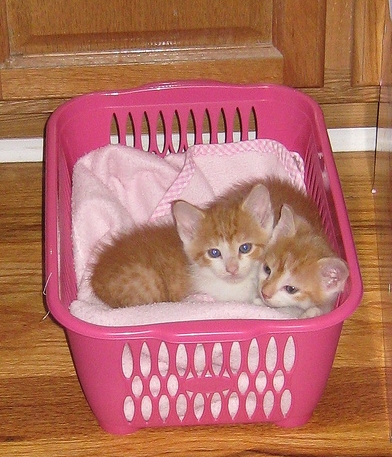
01: Kittens need time and attention
From training to playtime, kittens demand a lot of time and attention. Kittens don’t like to be left alone for long periods of time. If you, or someone in your household won’t be able to keep your kitten company, you shouldn’t get a kitten. Kittens looking for attention are like children looking for attention. They’ll get into all sorts of trouble. You need to be able to dedicate time to playing with them, cuddling them and training them. If not, your kitten won’t grow to be a happy, well behaved cat.
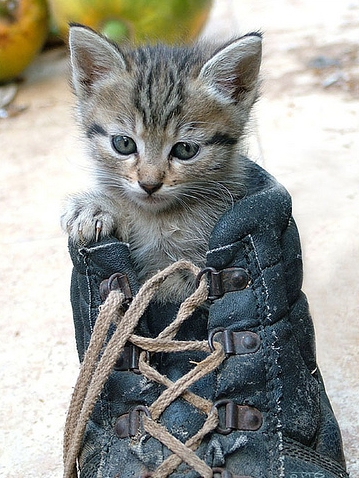
Choosing to take on the responsibility of adopting a kitten is an important decision but just look at that little face in the picture above? Is it worth it? Remember, though – kittens don’t stay little forever. Eventually, your kitten will grow into a cat and what kind of cat your kitten grows into will depend on how well you raised it.
You can never be fully prepared for a kitten. They all have their own little personalities and they all come with their own unique challenges. If you follow this basic guide and are truly honest with yourself about whether or not you’re ready, you will do fine.
In my next kitten article, we’ll talk a bit more about training your kitten, finding the right way to discipline your kitten, common kitten illnesses and how to prevent them and making fun and interesting toys your kitten will love to play with. If you’d like to see something covered in my next kitten article, be sure to let me know in the comments section below. Finally, if you found this guide helpful, share it with your friends on Facebook and Twitter. Thanks for reading.











